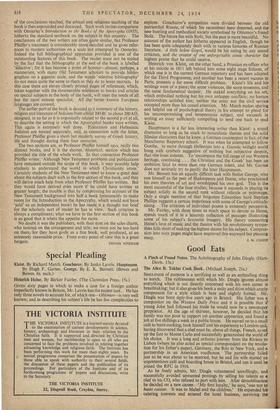Special Pleading
Heinrich Heine. By Barker Fairley. (The Clarendon Press. 15s.) GIVEN sixty pages in which to make a case for a foreign author imperfectly known in Britain, Mr. Lavrin has the easiest task. He has only three novels to account for, of which one—Oblomov--is very well known; and in describing his subject's life he has few complexities to explore. Goncharov's sympathies were divided between the old patriarchal Russia, of which his recumbent hero dreamed, and the new bustling and methodical society symbolised by Oblomov's friend Stolz. The future lies with Stolz, but the past is more beautiful. No account of the author has hitherto appeared in English, though he has been quite adequately dealt with in various histories of Russian literature.. A little below Gogol, would be his rating by any sound criticism, and the creator of one unforgettable comic character the highest praise that he could receive.
Heinrich von Kleist, on the other hand, a Prussian ex-officer who at his suicide in 1811 left behind him some eight stage failures, of which one is in the current German repertory and has been adapted for the Third Programme, and another has been a recent success in Paris, presents a far more difficult problem. Kleist's life and his writings were of a piece; the same violences, the same tenseness, and the same fundamental despair. He staked everything on his art, which embodied nothing but his own unhappy conflicts; no human relationships satisfied him; neither the army nor the civil service occupied more than his casual attention. Mr. March makes sparing and helpful use of psychological theory in his attempt to plead for his uncompromising and tempestuous subject, and succeeds in writing an essay sufficiently compelling to send one back to read Kleist.
Hauptmann is a far less interesting writer than Kleist: a sound dramatist so long as he stuck to naturalistic themes and the solid Silesian characters that he knew, a German counterpart in fact, of the Manchester Repertory school. It was when he attempted to follow Goethe, to move through Hellenism into a Gnostic twilight world hung with symbols suggestive of nothing but subjective despair, that ohe loses interest. To 'encompass the full range of our Western heritage, combining . . . the Christian and the Greek' has been an ambition fatal to more than one German talent, and Mr. Garten does not seriously try to justify the later Hauptmann. Mr. Bennett has an equally difficult task with Stefan George, who saw himself as the peer of Shakespeare and Dante, who proclaimed his own theories of art and worshipped his own god. This is the most successful of the four studies, because it succeeds in placing its subject solidly in the second rank without ridicule or patronage. Only a single mention of that forgotten Edwardian bard Stephen Phillips suggests a certain impatience with some of George's attitudi- nising. The criticism of individual poems is extremely perceptive. Mr. Fairley, with three times as much space to devote to Heine, spends much of it in a leisurely collection of passages illustrating some of his subject's favourite imagery. His theory connecting Heine's love of music and the theatre with his revolutionary sympa- thies falls short of making the highest claims for his subject. Compres- sion into sixty pages might have improved this wayward but pleasing essay. J. M. COHEN


























 Previous page
Previous page